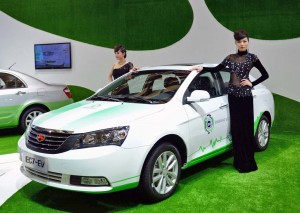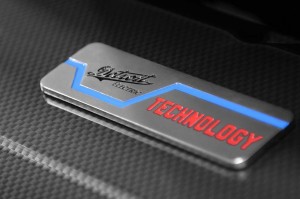Bucking the slower-than-expected start-up of the battery-car market, little Detroit Electric plans to have its first model, a battery two-seater, in production this coming summer – and the Michigan-based start-up now hopes to get a helping hand from Geely, the owner of the Volvo brand, as part of a new joint venture with the ambitious Chinese carmaker.
The two companies have entered into a strategic partnership to co-develop pure electric vehicles and related electric drive systems for the Chinese market. Under the terms of the partnership the first model will go on sale through Geely’s Emgrand brand starting in 2014.
The partnership with privately-held Geely represents a major coup for fledgling Detroit Electric, which claims it is being courted by automakers from around the world eager to penetrate the Chinese market. China’s bureaucrats, eager to address that nation’s endemic air pollution problems, are putting a premium on the growth of the battery-electric vehicle market.
The decision to utilize the Emgrand EC7, one of Geely’s top-selling models, as an electric vehicle followed three years of feasibility studies and a joint development program.
The co-branded vehicle will carry a “Detroit Electric – Technology” badge and sales are expected to commence in the first quarter of 2014.
(Resurrected Detroit Electric Has Big Plans for Battery Market. Click Here for that story.)
The vehicle will initially be sold primarily to business users and public-sector organizations, and the two companies are forecasting sales of around 3,000 units during the first year, with an ambitious goal of boosting sales to 30,000 in three years.
“This is a very significant step in the development of the Detroit Electric business and is testimony to our innovative technology and engineering capabilities,” said Albert Lam, the former Lotus executive who is the founder chairman and group chief executive officer of Detroit Electric.
(Check out Top 10 Green Cars for 2013. Click Here.)
Detroit Electric’s unusual approach to the automotive business emphasizes outsourcing most key components, including body and chassis, while focusing on the core electric powertrain components and the underlying control technologies. That fits the Geely joint venture, the Michigan firm responsible for powertrain, chassis, vehicle dynamics and system integration, among other elements of the EV project, said Lam.
“We have been working alongside Geely for some time to optimize the EV drive technologies for integration into the vehicles and this partnership will now fast-track both Geely and Detroit Electric to (help them) realize the great EV market potential in the Chinese market,” Lam added. “I am confident that we can become a leader of pure electric vehicles in the Chinese market within the next 18 months. I am sure it is going to be a world class product.”
For its part, Geely said it expects the partnership “to enhance and accelerate our own expertise and knowledge in this area. The EC7-EV will enable us to provide a wider vehicle choice to our customers and it also reiterates our commitment to providing alternate energy vehicles to the market in China.”
A joint development and engineering team recruited from both companies is now in place and a joint venture company to manufacture the critical EV powertrain components and associated parts is being set up close to Geely’s headquarters in Hangzhou, the capital of Zhejiang province.
Geely currently operates six car assembly and powertrain manufacturing plants across China.
The new EC7-EV offer both medium-range, at about 105 miles per charge, and long-range options, at 160 miles per charge.
(New study anticipates at least 5 million battery cars on U.S. roads by 2035. Click Here.)
Earlier this month Detroit Electric unveiled its first production vehicle, the SP:01. Boasting an impressive top speed of over 150 mph, and a 0 to 60 launch of around 3.6 seconds, the firm bills the 2-seater as “the world’s fastest pure-electric production car.”
Detroit Electric expects to follow with two more mainstream battery-electric models in 2014.
Detroit Electric officials acknowledge they have borrowed much of their strategy from Tesla Motors – which also launched a sports car as its first product. Tesla has helped boost its balance sheet with several joint ventures of its own, including alliances with both Toyota and Daimler AG.



Exporting U.S. IP tech to China is a bad decision that will hurt all Americans.